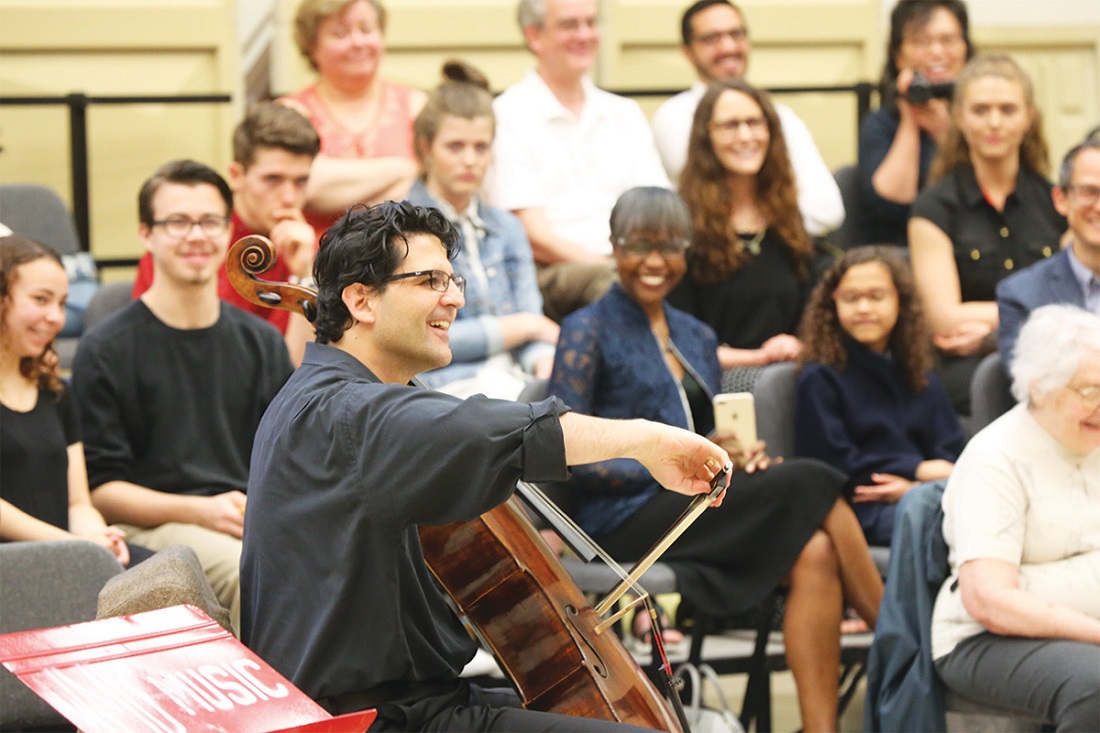WRITER | NICOLETTE CHAMBERY
PHOTOS l THE STULBERG INTERNATIONAL STRINGS COMPETITION
Music Changing Lives
It was at the 1980 Stulberg International String Competition that 12-year-old Joshua Bell stood before the judges and began to play the first notes of his selected piece, only to hear them fall flat. He stopped, turned to the judges and asked if he could start over, after which he gave an outstanding performance that earned him the bronze medal. Today, he is renowned Grammy award-winning violinist whose talent has touched audiences around the world.
It is precisely this caliber of applicant — as well as judges and even audience members — that the Stulberg has drawn annually since its inception in 1975. Intended as a memorial for the late Julius Stulberg, a beloved and respected professor at Western Michigan University and conductor of both the University Symphony and Kalamazoo Junior Symphony for many years, the competition has gained impressive nods from the international string community. The competition continues to attract some of the finest young musicians, who rightfully understand the value of being selected to compete, for out of over 150 applicants, only 12 are accepted.
The qualification process is fairly straightforward: Competitors have to be age 19 or under and play the violin, viola, cello, or double bass. Interested parties submit an audition video along with their application form and a fee, and a panel of judges reviews all entries and selects 12 semifinalists.
The semifinals take place on a single day between 9 a.m. and 4 p.m. Each semifinalist performs the piece or movement from their audition video as well as a Bach solo piece. Six are chosen to advance to the finals, where they perform a piece no more than 15 minutes in length, adhering to guidelines provided by the organization. All semifinalists are awarded a monetary prize, and medalists are awarded the opportunity to perform with an orchestra from the surrounding area.
The Burdick-Thorne gold medal is awarded to the first-place finalist, who receives a $6,000 cash prize and an opportunity to perform with either the Kalamazoo Symphony Orchestra or the Grand Rapids Symphony Orchestra.
The silver medal is awarded to the second-place finisher as well as $5,000 in cash and the opportunity to play with the Western Michigan University Symphony Orchestra.
The Pinehurst bronze medal, $4,000 in cash, and a performance with the Kalamazoo Junior Symphony go to the third-place winner.
$1,000 is awarded to each of the other nine semifinalists, and the $500 Bach award is given for the best solo Bach performance.
Margaret Hamilton is the executive director and guides the organization’s remarkable program. Hamilton grew up in a family that sang and was supportive of her desire to pursue music throughout her academic career. After working in the Western Michigan University School of Music for 25 years, she joined the Stulberg International String Competition in 2013.
In addition to the competition, the organization also hosts Master Classes – classes taught by world-class artists who provide sound instruction to promising young performers. The classes are free to both the participants and the public, although individuals who wish to perform are selected by audition. Master classes offer a fascinating glimpse into the creative and pedagogical process for performers and audiences alike.
This year’s competition takes place on May 18 at the Dalton Center Recital Hall at Western Michigan University and is open to the public. Admission to the daytime semifinals is free. Tickets are required for the evening finals concert: $20 for adults and $5 for students.
Further information about the competition is available on the Stulberg website.
Stulberg International String Competition Epic Center – 359 South Kalamazoo Mall, Suite 14, Kalamazoo, MI 49007 l (269) 343-2776 l Stulberg.org








